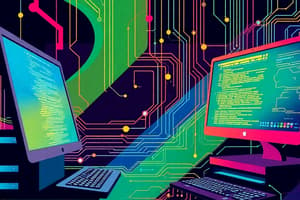Podcast
Questions and Answers
What is the significance of CPU frequency in computer processing?
What is the significance of CPU frequency in computer processing?
CPU frequency, measured in Hz, indicates the number of pulses per second that the CPU can process, influencing its speed and performance.
Describe the primary uses of supercomputers.
Describe the primary uses of supercomputers.
Supercomputers are primarily used for complex tasks such as space exploration, nuclear weapons testing, weather forecasting, and earthquake studies.
What differentiates mainframe computers from supercomputers?
What differentiates mainframe computers from supercomputers?
Mainframe computers are very fast and can be used by thousands simultaneously, while supercomputers are the fastest and are typically larger and more expensive.
What are the two main types of computer mice, and how do they differ?
What are the two main types of computer mice, and how do they differ?
List and briefly describe the different categories of computers based on size and capability.
List and briefly describe the different categories of computers based on size and capability.
What is the role of the CPU in a computer system?
What is the role of the CPU in a computer system?
List the two types of computer memory and briefly describe each.
List the two types of computer memory and briefly describe each.
What distinguishes application software from system software?
What distinguishes application software from system software?
What is the significance of CPU frequency in determining computer speed?
What is the significance of CPU frequency in determining computer speed?
Define hardware and provide two examples.
Define hardware and provide two examples.
What type of software would you use to create computer programs?
What type of software would you use to create computer programs?
How do input and output units differ in a computer system?
How do input and output units differ in a computer system?
Describe what a clock cycle is in relation to a CPU.
Describe what a clock cycle is in relation to a CPU.
Flashcards are hidden until you start studying
Study Notes
Computers Overview
- Computers are electronic devices that manipulate data, capable of storing, retrieving, and processing information.
- Common uses include typing documents, sending emails, playing games, browsing the Web, and creating spreadsheets, presentations, and videos.
Computer System Components
- A computer system is comprised of hardware (physical components) and software (instructions for hardware).
- Four basic hardware components:
- Input units: Devices like keyboards and mice that send data to the computer.
- Output units: Devices such as monitors, printers, and speakers that retrieve information from the computer.
- CPU (Central Processing Unit): Responsible for performing arithmetic and logical operations in the computer.
- Memory: Stores data, similar to human memory, featuring short-term (RAM) and long-term (HDD or CDD).
Software Classifications
- Software instructs hardware on task execution, including web browsers, games, and word processors.
- Three types of software classifications:
- Application software: Designed for user tasks like word processing and web browsing.
- System software: Essential for starting and running computer systems, including operating systems (Windows, Linux, Android).
- Computer programming software: Utilized to develop application and system software.
Computer Speed Factors
- CPU frequency, measured in Hertz (Hz), is a critical factor affecting computer speed.
- Clock cycle: Time between adjacent pulses of the oscillator that sets CPU tempo, with the number of pulses per second defining CPU frequency (clock speed).
Types of Computers by Size, Cost, and Speed
-
Supercomputers:
- Fastest, with speeds up to 33.6 petaFLOPS.
- Size comparable to a whole building.
- Cost can reach up to $100 million.
- Uses include space exploration, nuclear weapons testing, weather forecasting, and earthquake studies.
-
Mainframe Computers:
- Very fast, capable of few petaFLOPS.
- Size of a large room, serving thousands simultaneously.
- Cost ranges from $100,000 to $2,000,000.
- Commonly used in banks, educational institutions, and insurance companies.
-
Minicomputers and Microcomputers:
- Smaller, generally used for specific tasks or personal use.
Workstations and Personal Computers
- Workstation computers: High-performance systems for technical or scientific applications.
- Personal Computers (PC):
- Desktop computers: Designed for stationary use.
- Laptops/Notebooks: Portable computers for convenience.
Mobile Computers and Devices
- Include PDAs, Tablet PCs, handheld computers, and smartphones, prioritizing portability and functionality.
Mouse Types
- A mouse is a pointing device that allows users to interact with objects on the screen.
- Main types of mice:
- Optical mouse: Utilizes an electronic eye for movement detection; easier to clean.
- Mechanical mouse: Uses a rolling ball; tends to be less expensive but may require more maintenance.
Studying That Suits You
Use AI to generate personalized quizzes and flashcards to suit your learning preferences.



